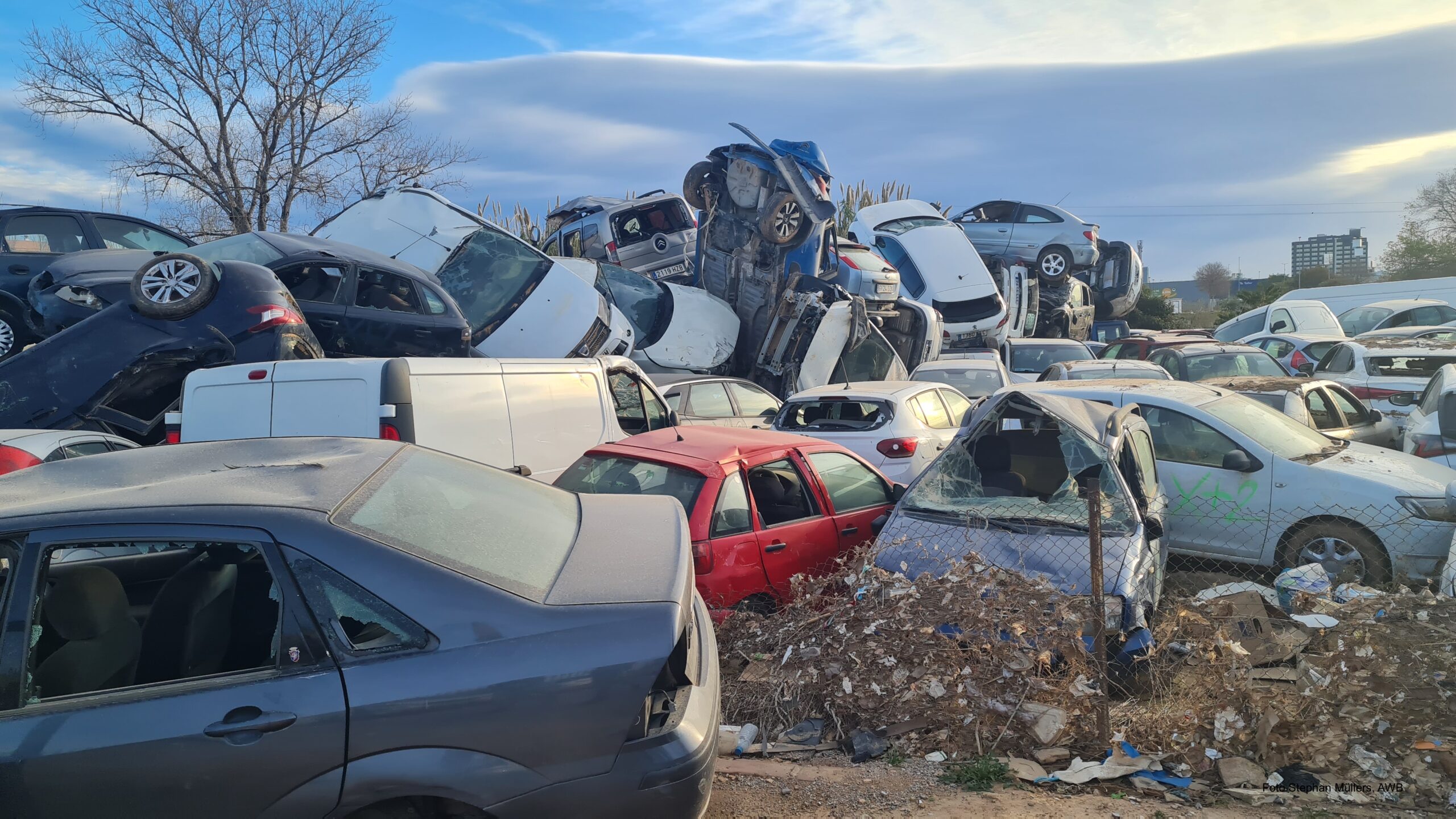
01.2025 After the flood – waste and no end, also in Valencia
Like the Ahr Valley in 2021, the Valencia region was hit hard by flooding in October 2024. Currently, waste management experts and scientists in Valencia are discussing the challenges and possible solutions.
The public images from Valencia are strongly reminiscent of the events in the Ahr Valley and evoke sympathy for the affected people in Spain. Eveline Lemke, former Minister of Economic Affairs of Rhineland-Palatinate, accepted an urgent invitation from the local municipal association and the Clean Waste cluster, together with Stephan Müllers, technical director of the Ahrweiler waste management company, and Prof. Alexander Fekete from the Cologne University of Applied Sciences. Together, the experts were on site from January 8 to 11, 2025, to assess the situation and attend an expert conference at the Polytechnic University of Valencia.
Joint efforts for a better future
Müllers and Lemke have been working closely together since the 2021 Ahr flood. Among other things, they conducted a scientific study on the management of flood debris on the Ahr and closely monitored the actions of various stakeholders. The report was published the following year and received a great deal of attention. In view of the complex waste problems in Valencia, which still exist 60 days after the flood, the experience of the German experts was urgently needed.
Prof. Alexander Fekete’s international knowledge in crisis research complements the technical expertise in waste management in crisis management. The three German experts, together with Spanish practitioners from a network of waste management, under the direction of Prof. Miguel Angel Artacho Ramirez of the Polytechnic University of Valencia, have devoted themselves to the observation and development of solutions for the flood problem.
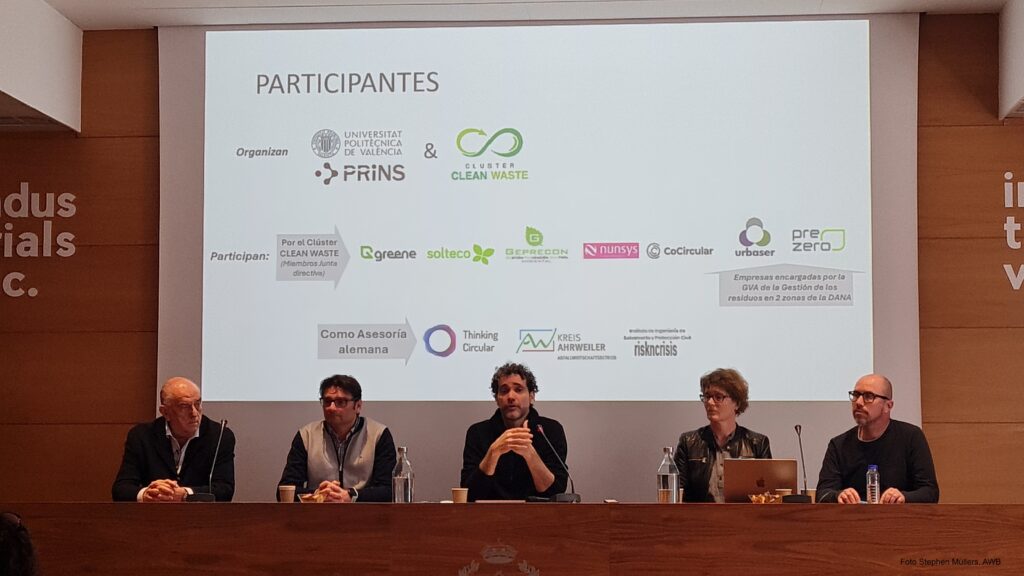
Expert conference at the Polytechnic University of Valencia. V.l.n.r.: Salvador Ortì, Cluster Clean Waste, Jesus Martinez, Greene, Prof. Miguel Ramirez, UPV, Eveline Lemke, Thinking Circular, Andé Höchemer, Dolmetscher
Satellite images and historical channel structures
Before their trip, the experts evaluated satellite images showing the silt deposits in the Valencian lagoon after the DANA flood. These images were supplemented by the impressions and reports of local residents whose plight is absolutely comparable to the situation in the Ahr valley in 2021. However, the extent of the overload of the drainage structures in Valencia, which date from the 8th century and were introduced by the Moors, was surprising. The overloading of these structures caused a flood with water levels of 1-2 meters in a wide swath, destroying 120,000 cars, among other things.
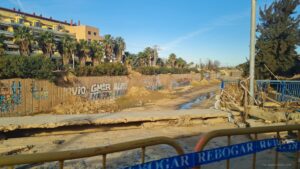
Drain in Valencia
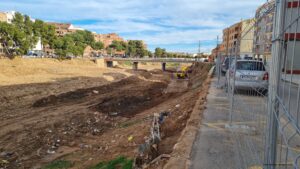
Drain in Valencia
Waste management challenges in Valencia
The situation on the ground presents Spain with significant challenges in the circular economy, as waste treatment practices there lag far behind German standards. This also applies to organizational structures, unsecured landfills, the lack of waste incinerators and the improper handling of hazardous waste. The lack of technical facilities for the disposal and treatment of waste makes it clear that the waste issue will continue to occupy the Valencia region for a long time to come. The exchange of ideas with scientific experts and stakeholders is to be intensified by setting up a group of experts in order to develop joint solutions.
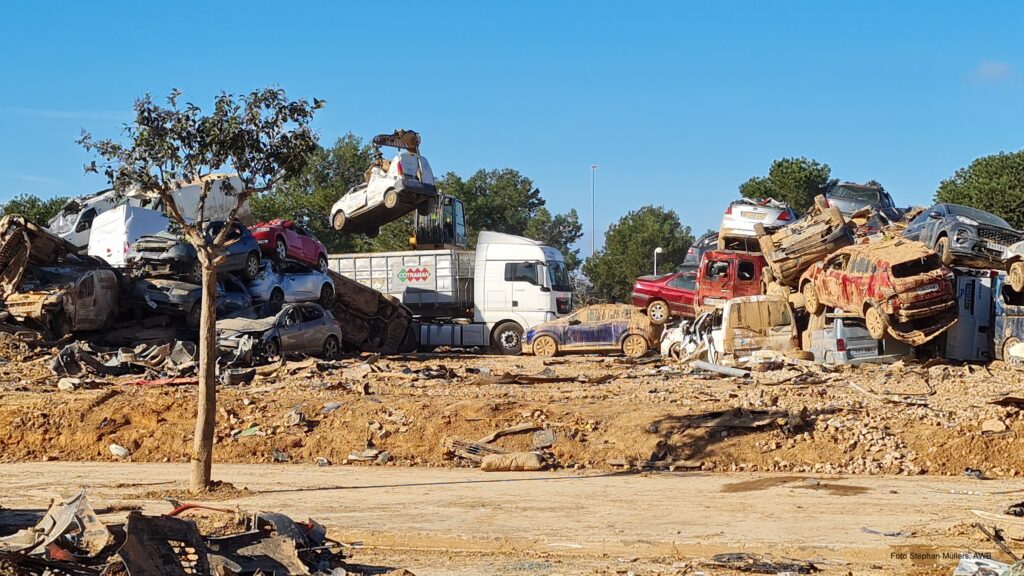
Damaged vehicles at an assembly point will be further destroyed during loading.
Challenges of the human dimension
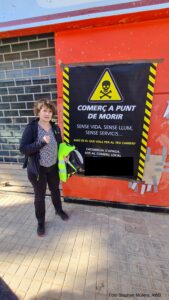
Eveline Lemke next to the announcement of a business closure
The suffering of the people in the affected neighborhoods is great. Although the drinking water supply in Valencia itself is working again, chaos and devastation still prevail in many places. The flood has claimed many lives, often people were trapped or swept away by the water in their cars, basements or in underground garages. These patterns are obviously similar to those in the Ahr Valley, but the dimension of the affected underground garages in Valencia is enormous and not comparable. Even today, three-storey underground car parks are being pumped dry, and 9,000 military personnel are still deployed to provide support. Large industrial areas have been affected and economic activity is severely restricted.
Future cooperation and research
“Out of sight, out of mind” seems to be the political motto when it comes to waste disposal, with unsorted waste being transported to quarries or landfills. The dangerous entry into the groundwater has received little attention so far. That is why the experts led by Prof. Miguel Angel Artacho Ramirez of the Polytechnic University of Valencia have formed a group that will be dedicated to observing and developing questions about flooding.
The exchange with scientific experts and those affected should be further intensified: “We want to invite our friends from Valencia to answer their questions with us and at our place. Together we can achieve more than alone. The topic of flood waste must also come to an end at some point; together we can perhaps be of help here,” says Eveline Lemke.
You can find the press review of the coverage in the Spanish media here.